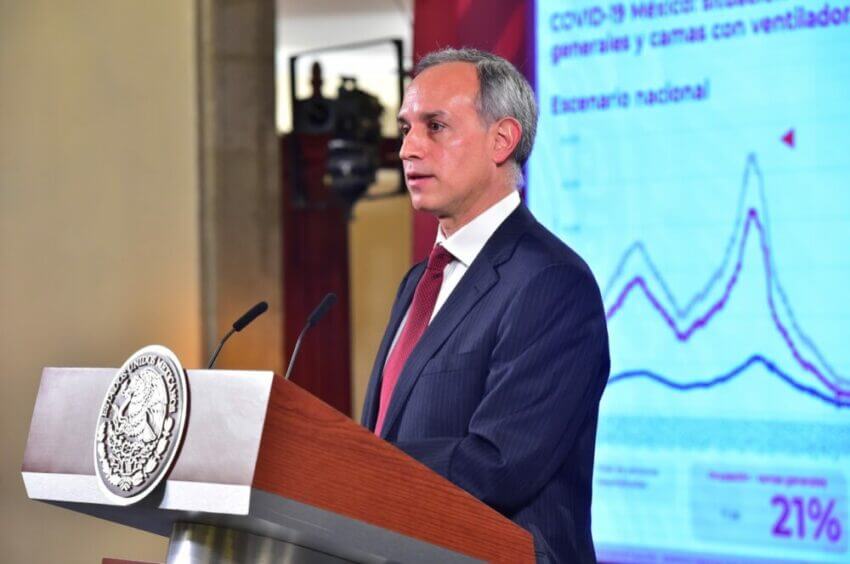Omicron is becoming the dominant strain of the coronavirus in Mexico, Deputy Health Minister Hugo López-Gatell acknowledged Tuesday as the fourth wave of infections continues to grow.
Mexico recorded 11,052 new cases on Monday, plus another 33,626 new cases today, lifting the accumulated tally to over 4.17 million and breaking a record for new cases diagnosed in one day that was set only this past Saturday.
There were 162 deaths recorded today, health officials said.
Daily case numbers declined significantly on Sunday and Monday after a new record of more than 30,000 was registered Saturday, but reported infections on those two days are invariably lower due to a drop-off in testing and/or the recording and reporting of test results on weekends.
Estimated active cases currently number 184,660. With today’s recorded deaths, the official COVID-19 death toll rose to 300,574.

Speaking at the federal government’s morning press conference on Tuesday, López-Gatell said that the highly contagious omicron variant is in the process of becoming the dominant strain in Mexico, as has occurred in other parts of the world.
The coronavirus point man, a John Hopkins University-trained epidemiologist, said that the variant is less likely to affect people’s lungs than previous strains such as delta. The symptoms omicron causes are “more similar” to those of the common cold, he said.
López-Gatell also said that vaccination against COVID-19 protects against pulmonary damage, adding that evidence suggests that illness caused by omicron is shorter than that caused by previous variants.
“The unfortunate infection” of President López Obrador, who announced Monday that he had tested positive but only has mild symptoms, “shows us what happens with the omicron variant,” the deputy minister said.
López Obrador appeared at his regular news conference via video link and declared he was feeling “quite well,” despite having a “burning” sensation in his throat and “a little bit of body pain.” He took his own temperature and measured his oxygen levels as he was beamed into the National Palace, and both were normal.
“… Let’s not be scared. Fortunately, this is a variant that doesn’t have the level of danger of the delta variant,” López Obrador said.
López-Gatell noted that COVID wards are only about one-fifth full despite the recent surge in case numbers. He also said that the Health Ministry is looking at the possibility of reducing the isolation period for affected people from two weeks to five days, as is the current advice in the United States.
As has occurred in other countries, the recent surge in case numbers has had a negative impact on various sectors of the economy as workers and their close contacts isolate. One of the affected industries is aviation, with hundreds of flights canceled in recent days.
Meanwhile, demand for COVID-19 testing remains very high. But unlike authorities in many other countries, the Mexican government is not encouraging people to get tested.
López-Gatell said that there is a shortage of tests both in Mexico and globally and for that reason people should abstain from getting tested unless they have “essential” medical reasons to do so.
“If everyone who has a cough and a sore throat rushes out for a COVID test, what will happen is that they will become anxious because they’ll be in a line, at a public or private laboratory, waiting to have a COVID test,” he said, adding that they will make accessing a test more difficult for people who really do need to find out whether they are infected or not.
In that category are people with chronic illnesses and the elderly, the coronavirus czar said.
“If a person has a chronic disease or is very old … he or she has greater probability of [COVID] complications,” he said.
Instead of running out to get tested, most people with coronavirus-like symptoms should stay at home, isolate and monitor their oxygen levels with an oximeter, López-Gatell said.
“I had a common cold myself last week and that’s why I didn’t come [to the press conference],” he said.
Mexico City authorities have also said that getting tested is not “exceedingly necessary,” but people continue to flock to testing centers in the capital. A young man who tested positive in the borough of Benito Juárez on Monday told the newspaper Milenio that he didn’t feel very sick but nevertheless wanted to find out whether he had contracted COVID-19.
“… It’s more about preventing [the spread of the virus],” said Francisco Javier, a México state man who works at a pizza restaurant in Benito Juárez.
He said he suspected he had contracted the virus because he is around a lot of people at work and those people likely gathered with family and friends over the Christmas period.
“At first I didn’t suspect [I had COVID] because I still had my sense of smell and taste, but since my throat closed up a little and my nose started to run I had my doubts,” he said.
According to federal government figures, some 184,000 other Mexicans are also currently infected – most likely by the omicron strain – but as official numbers for cases – and deaths – are considered significant undercounts due to a low testing rate, the real number of virus-carrying citizens is undoubtedly much higher.